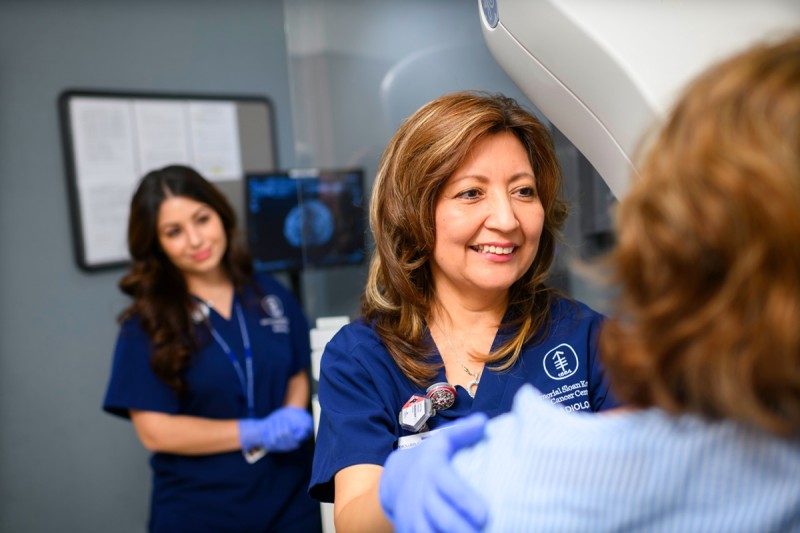
Researchers at MSK are focused on developing screening guidelines for people at increased risk of breast cancer because of certain inherited gene mutations.
Many people have heard of mutations in the BRCA1 and BRCA2 genes that are linked to an increased risk of certain cancers, including breast cancer. But there are other, less well-known genes in which hereditary mutations can also increase breast cancer risk, including ATM, CHEK2, and PALB2.
Doctors recommend earlier and more frequent screening for people with BRCA1 and BRCA2 mutations, but official guidelines have not been established for those with ATM, CHEK2, and PALB2 mutations. Now, researchers are turning to computer modeling to figure out what these mutations may mean and how people who have them should be screened.

Mark Robson
Memorial Sloan Kettering Cancer Center’s Mark Robson, Chief of the Breast Medicine Service, is studying this topic. Dr. Robson is the senior author of a new paper published on February 17, 2022, in JAMA Oncology that suggests modified screening guidelines could reduce the risk of death by more than 50% in females with a mutation in the ATM, CHEK2, or PALB2 gene. For females with one of these mutations, the model suggests the following screening schedule:
- Annual MRI screening, beginning between the ages of 30 and 35.
- Annual mammograms, beginning at age 40.
In the past, doctors haven’t been sure of the best age to start screening people with these inherited mutations, with what frequency they should be screened, and which patients require supplemental imaging. The models provide a framework to make recommendations that are based on reliable data rather than guesswork.
Together, mutations in these three genes are about as common as mutations in the two BRCA genes, but these mutations have what is called a lower penetrance: That means they are less likely to cause cancer in people who have them. That makes them harder to study in prospective (forward-looking) studies, because the chances are reduced that any individual being followed will develop cancer.
Screening Depends on Genetic Risk
For females with a standard risk of breast cancer, MSK’s screening guidelines recommend that annual mammograms begin at age 40. But for those with a strong family history or inherited mutations, and those who received radiation to the chest at an early age, experts recommend beginning mammograms at a younger age and/or having regular screening with MRIs in addition to mammograms.
MRI screening is not recommended for females at average risk, because these tests have a higher rate of false positives; these can lead to anxiety and unnecessary biopsies. But for younger females at increased risk, MRIs are more effective than mammograms, Dr. Jochelson says. “That’s in part because younger women are more likely to have dense breasts, and MRIs may pick up cancers that mammograms miss,” she explains.
For people with an increased risk of breast cancer, the experts in MSK’s Risk Assessment, Imaging, Surveillance, and Education (RISE) program develop long-term surveillance plans specific for each patient. Recently, the RISE program has been including people of all genders who are at higher risk of breast cancer.
With So Many Genetic Tests, a Growing Need to Know What They Really Mean
In the new study, the investigators used data from about 32,000 breast cancer patients, along with a similar number of people who did not have cancer. The computer model evaluated using MRI and mammography combined, compared with mammography alone. The results suggested that adding MRI to mammography and starting MRI at a younger age would provide significant benefit to women with a mutation in ATM, CHEK2, or PALB2.
The three mutations are also linked to an increased risk of other cancers in addition to breast cancer — ATM is associated with pancreatic cancer, CHEK2 with colorectal cancer, and PALB2 with ovarian cancer. MSK has registries and screening programs for patients at higher risk of other cancers, including colorectal cancer and pancreatic cancer.
As genetic testing becomes more common for individuals with cancer and those with a family history, more people are learning they have inherited genes that make them susceptible to cancer. They wonder what they should do with that knowledge and how to protect themselves.
“We hope that these models will be a piece of information considered by the experts who make screening guidelines,” Dr. Robson says. “This will help doctors everywhere to better guide their patients.” Screening guidelines are generally set by the National Comprehensive Cancer Network, expert panels from leading cancer hospitals around the country, including MSK, as well as the American Cancer Society and the American College of Radiology.
Other authors on the paper are part of the Cancer Intervention and Surveillance Modeling Network, the Cancer Risk Estimates Related to Susceptibility Consortium, and the Breast Cancer Surveillance Consortium. The lead author on the paper is Kathryn Lowry from the University of Washington.
- Mutations in the genes ATM, CHEK2, and PALB2 are linked to an increased risk of breast cancer.
- Because these mutations are less likely to cause cancer, it’s been difficult for experts to develop screening guidelines.
- A new study uses computer modeling to suggest the best guidelines for people with ATM, CHEK2, and PALB2 mutations.
- The model suggests that annual MRI screening should begin between the ages of 30 and 35, and annual mammograms should begin at age 40.




